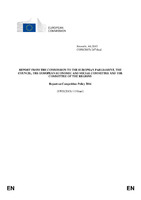| dc.description.abstract | 2014 marked a new start for Europe. Following the European elections, the European Parliament gave its green light to the new European Commission on the basis of the priorities outlined in President Juncker’s Political Guidelines1.The mission letter addressed to Margrethe Vestager, Commissioner for Competition, states that competition policy would “contribute, as appropriate, to our jobs and growth agenda, including in areas such as the digital single market, energy policy, financial services, industrial policy and the fight against tax evasion”2. Indeed, competition policy encompassed all these areas in 2014 and provided a sound foundation to build upon in supporting the overall policymaking of the European Commission. Competition policy can help building a genuine Digital Single Market. In the knowledge-based sectors, vibrant competition is essential to stimulate innovation and spread the benefits of technological development among Europe’s citizens. In addition, effective enforcement of antitrust and merger policy makes it easier for small businesses to thrive and gain access to markets in sectors dominated by network effects. Finally, the application of State aid rules to the broadband sector helps to provide good coverage at affordable prices. In the energy sector, competition policy ensures that companies do not maintain or re-erect barriers to protect themselves from competition, hampering the establishment of a European Energy Union. Competition enforcement also helps to ensure fair and non-discriminatory access to energy infrastructure, removes obstacles to market integration, and fosters competition between and within Member States. Moreover, the revised State aid rules on energy and environment assist Member States to better target their support for example to renewable energy sources, infrastructure investments, generation capacity or relief of electro-intensive users from the financing of renewables support. The Commission has been particularly vigilant in financial services with the main goal of bringing a stable and fairer financial sector back to its core function of lending to the real economy. The creation of the Banking Union is increasing the confidence of European citizens and markets in the European banking system. Enforcement actions coupled with regulatory efforts also focused on tackling anticompetitive practices in financial derivatives and in the payments sector |

